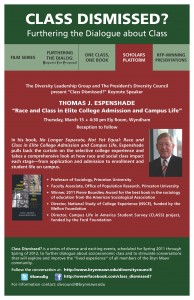[When] Monday March 19th, 5-6:30pm
[Where] Campus Center Main Lounge
[What] Last spring, as part of a yearlong initiative titled “Class Dismissed? Furthering the Dialogue About Class,” the President’s Diversity Council and the Diversity Leadership Group invited members of the Bryn Mawr campus community to submit proposals for collaborative projects designed to spark dialogue on the topic of class. Five groups received funding. Their work since last spring is noted below, as well as what they will share Monday. We hope you’ll attend!
Who Matters: Staff Perceptions of Social Class at Bryn Mawr College, by Melanie Bethea, Naté Hall, Maruyi Yu and Stephanie Wujcik. Monday’s program will kick off with this group’s short documentary focused on the ways that staff experience class at the College.
Class and Health Care. Sally Heimann, who collected personal stories about this connection, will present one audio interview and have additional interviews available at a listening station.
Benchmark. Addie Ansell, Jessica Wong, and Kady Ruth Ashcraft used a mobile bench to allow community members in various locations around campus to share their stories. Monday’s attendees can hear the stories through headphones at a listening station.
Storytelling: A Celebration of Class. Earlier this semester, the Executive Board of the student Self Government Association (Yong Jong Cho, Rebecca Sanders, Tina Hu, Mae Carlson, and Priya Saxena) presented “Bedtime Stories,” in which administrators and faculty shared accounts of experiences with class. On Monday, they will display an assortment of speech bubbles to provide a visual representation of people’s thoughts on the topic.
Mapping Out Class. Jody Cohen, Anne Dalke, Sarah Jenness, Alice Lesnick, Jomaira Salas, Samantha Saludades, Mfon-ido Akpan, Ellen Li and Michaela Olson worked with E-Sems to examine daily life experiences on campus through the lens of class. Many community members participated in this group’s fall workshop; on Monday, the group will present two activities about money and class.
The program will begin with a welcome by President McAuliffe. Refreshments will be served.



